|
|
|
Sort Order |
|
|
|
Items / Page
|
|
|
|
|
|
|
| Srl | Item |
| 1 |
ID:
185523


|
|
|
|
|
| Summary/Abstract |
This article presents findings from research conducted in Long Beach, California on the history, motives, and functions of the Cambodian People’s Party Youth Organization (CPPYO), a network of Cambodians outside the country who support Cambodia’s long-time ruling party, the Cambodian People’s Party (CPP). Officially, the CPPYO, headed by Cambodian Prime Minister Hun Sen’s son, Hun Manet, was created to promote the current government and to provide political options for Cambodians living abroad. However, many Cambodians in the Long Beach area see the CPP’s presence in the US as invasive and as a threat to their autonomy. To understand how the CPPYO functions in Long Beach, we make use of Gerschewski’s three pillars of authoritarian stability1 and Glasius’ framework for identifying extraterritorial authoritarian practices.2 We conclude that the CPPYO is primarily a strategy for repressing opposition abroad, but that it also contributes to the ruling party’s legitimacy through the participation of Long Beach Cambodian Americans, who accept the CPP’s authoritarian control as a condition for participating in Cambodia’s socioeconomic system. This study contributes to a growing body of research interested in identifying and interconnecting the various legitimation processes, strategies, and practices developed by autocracies to stabilize rule at home and abroad.
|
|
|
|
|
|
|
|
|
|
|
|
|
|
|
|
| 2 |
ID:
168246
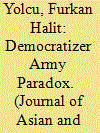

|
|
|
|
|
| Summary/Abstract |
The main paradox of the civil–military relations theory has been the protection of the political sphere from the military, which is administered by the politicians. The new dilemma lies under the paradox that occurs when the political sphere is entirely co-opted by the military, which is legitimized through democratization instead of protection of the civilian sphere. The question regarding the continuity of the pathology, the military superiority over the civil administration, has been largely omitted. This study is an attempt to respond to this conundrum related to the continuity of pathological civil–military relations. The main focus is the pathology that occurs when the military is the modernizer or the democratizer in a country. The study uses process tracing to collect the data as research attempts to unravel the rationale behind the continuity of military dominance in politics. In doing so, it will attempt to trace the causality between the lack of democratization and military dominance over politics in the case of Algeria.
|
|
|
|
|
|
|
|
|
|
|
|
|
|
|
|
| 3 |
ID:
187733
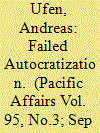

|
|
|
|
|
| Summary/Abstract |
Malaysian Prime Minister Najib Razak’s systematic strategy of autocratization backfired. This paper is based on a model of three pillars of authoritarian regimes. It traces the different strategies and measures employed to weaken the opposition and shows that major survival strategies were prone to frequent shifts. At the beginning of his tenure, Najib depicted himself as a reformer, and refined some forms of repression. The regime scrapped central coercive tools such as the Internal Security Act, but later replaced them with kindred, yet ineffective measures. Co-optation was more centralized and “money politics” expanded. The widespread and unprecedented usage of patronage resulted in corruption, which fundamentally destabilized the regime. Legitimation was modified since 2013 to a more Malay-centric and Islamist discourse. Because of this shift, legitimation eroded among ethnic and religious minorities. The prime minister’s legitimacy shrank due to corruption scandals. This paper helps gauge the lacking complementarity of the pillars and the failures of an authoritarian regime in crisis, which is important also with a view to political developments in Malaysia since 2018.
|
|
|
|
|
|
|
|
|
|
|
|
|
|
|
|
| 4 |
ID:
166151
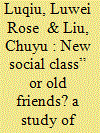

|
|
|
|
|
| Summary/Abstract |
In this research note, we introduce a new dataset on China's national legislators. It provides descriptive information on one key parameter: the nature of the business owned by private entrepreneur deputies in China's National People's Congress (NPC) from 2003 to 2017. The dataset contains information on whether the deputy once worked as a government official, whether the deputy was a former top manager of a state-owned/collective enterprise, and whether his/her current company was a state-owned/collective enterprise before being privatized. We categorize deputies as “insiders” as long as they stratify one of the aforementioned backgrounds, whereas others as the “grassroots.” This dataset thus reveals two types of private entrepreneur deputies who are significantly different with regard to how they started their own businesses. These findings shed new light on the relationship between private entrepreneurs and the party-state in China.
|
|
|
|
|
|
|
|
|
|
|
|
|
|
|
|
| 5 |
ID:
171029


|
|
|
|
|
| Summary/Abstract |
Scholars have long identified the pivotal importance of business-led governance in the Hong Kong and Macau Special Administrative Regions (SAR) of China. Both are governed under a “one country, two systems” arrangement which in theory provides autonomy. However, this identical formula has resulted in very different trajectories, as the coalition in Hong Kong has failed to serve as an effective intermediary between the state and society amidst a series of governing crises, whereas the one in Macau has been largely successful in maintaining political stability. This article argues that a new class of elites in Macau has emerged and competes for political influence by building communal networks and mobilizing social support. In contrast, a relatively static elite structure in Hong Kong has done little to adapt to changing political circumstances.
|
|
|
|
|
|
|
|
|
|
|
|
|
|
|
|
| 6 |
ID:
163235
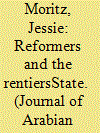

|
|
|
|
|
| Summary/Abstract |
The oil and gas-rich states of the Gulf Cooperation Council have long been treated as exceptional, where distributions of rent-based wealth to society assumedly preclude political dissent. Yet, by examining informal and formal opposition in Qatar, Bahrain, and Oman since 2011, this article disputes the effectiveness of this “co-optation mechanism” at the sub-national level. Drawing from 135 semi-structured interviews conducted with citizens of these states, it uncovers evidence of challenges to state authority even among nationals who should theoretically be co-opted. In examining the limits of rent-based co-optation, the article highlights two key political dynamics that have demonstrated a capacity to overpower rent-based incentives to remain politically inactive: ideology and repression. Societies, then, were far from quiescent, and this research examines the networks and dynamics that have allowed citizens to challenge state authority.
|
|
|
|
|
|
|
|
|
|
|
|
|
|
|
|
| 7 |
ID:
126968


|
|
|
|
|
| Publication |
2013.
|
| Summary/Abstract |
This paper investigates the nature of secularism practiced by the Singapore state, focusing on the two main Islamic organizations, MUIS and Pergas. I postulate that the state uses "muscular" and "calibrated" secularism to manage them, and co-opts them either formally or informally. The two organizations agree to such an arrangement.
|
|
|
|
|
|
|
|
|
|
|
|
|
|
|
|
| 8 |
ID:
165075
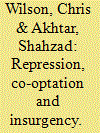

|
|
|
|
|
| Summary/Abstract |
Scholars have long identified state repression as playing a key role in the onset of insurgency. Violence by security forces increases anger against the state and assists with rebel recruitment. Yet scholars have also recognised that repression does not always lead to rebellion: in some cases it successfully quashes movements before they have begun. This study advances an argument for when and why repression leads to insurgency and sometimes does not. We contend that violence by state security forces can fail to trigger rebellion if local elites within the repressed community are simultaneously co-opted with political and economic opportunities. When elites are satisfied with local autonomy and patronage they deprive the dissident movement of local leadership and coordination. When the state uses repression against a community and at the same time abandons this mutually beneficial relationship, the insurgency has both the leadership and grassroots support it requires. We illustrate our argument by examining three cases of state violence in Asia. In two of our cases, Pakistan’s Federally Administered Tribal Areas (FATA) and Southern Thailand, repression led directly to insurgency. In the third, Papua in Indonesia, ongoing co-optation of local elites has left the movement factionalised and weak.
|
|
|
|
|
|
|
|
|
|
|
|
|
|
|
|
| 9 |
ID:
180896
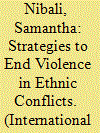

|
|
|
|
|
| Summary/Abstract |
After decades of violent separatist conflict between the Russian Federation and the Chechen Republic, Russian President Vladimir Putin declared the region stabilized and peaceful in 2008. Despite this grand proclamation of peace, Chechnya today operates under an environment of violent repression and the conflict remains un-managed. This article argues that a threshold of sufficiency exists which settlement strategies must pass to achieve peace. While a perceived peace may occur when the armed conflict ends, without sufficient management strategies the identity-based roots of the conflict will manifest in other forms beneath the surface. By examining co-optation, power-sharing, autonomy and reconciliation, this research finds that while Russia’s incomplete conflict management strategy may have ended the violent insurgency within Chechnya, the failure to apply these principles sufficiently has allowed violence to continue. This research hopes to be applicable in informing strategies to resolve conflicts in multi-ethnic states within and beyond the North Caucasus.
|
|
|
|
|
|
|
|
|
|
|
|
|
|
|
|
|
|
|
|
|